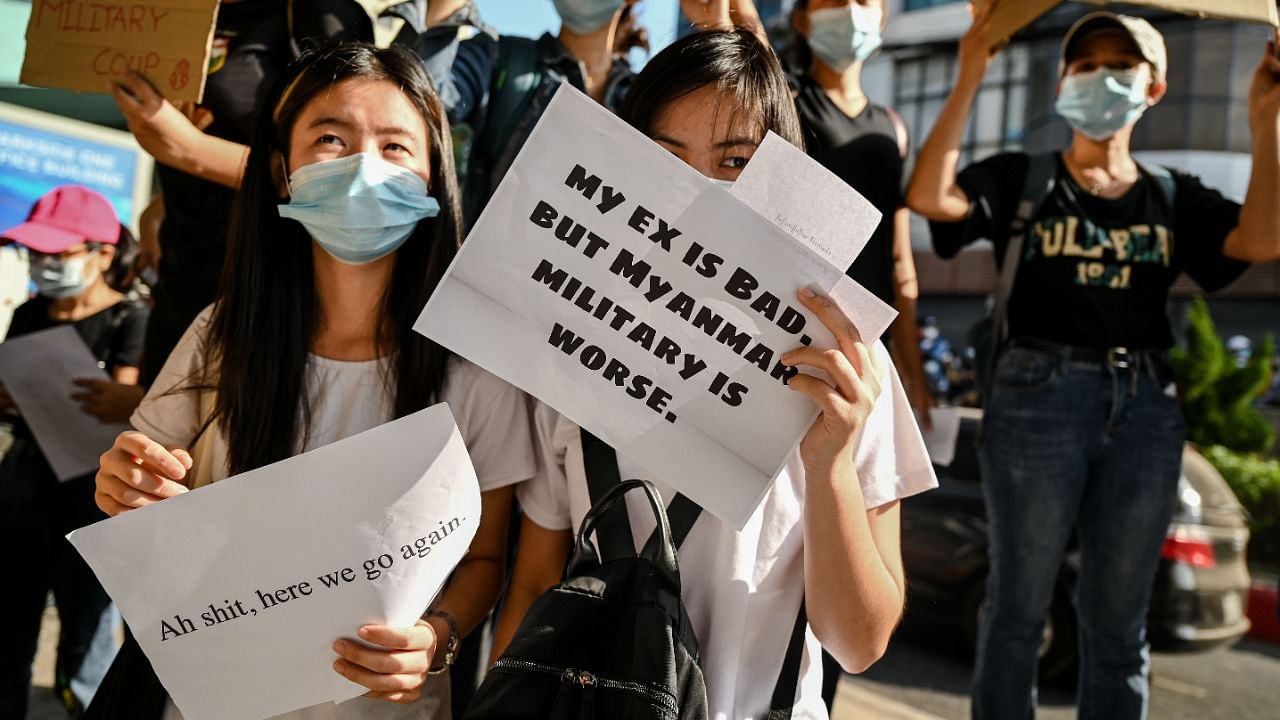
Their signs say it all: Myanmar's ruling junta is worse than an ex-boyfriend, fouler than fish curry, rejected by millions and more painful than a period.
As they flood streets across the country in opposition to last week's military coup, a younger generation of Myanmar protesters are cracking jokes at the military's expense and winning fans on social media with their colourful, witty and often explicit signage.
The situation is so bad, "even the introverts are here", as one demonstrator's poster put it.
"My ex is bad, but Myanmar military is worse," said another.
Scorn has particularly been heaped on army chief Min Aung Hlaing, now in charge after the coup deposed civilian leader Aung San Suu Kyi.
"Our dreams are higher than MAL's height," read a handwritten cardboard sign -- a reference to the commander-in-chief's diminutive stature.
"Min Aung Hlaing I hate you more than my periods," said another held out a car window.
Photos of the relatable, sly remarks have been shared thousands of times on social media, with retweets and comments from users in Hong Kong, the United States and elsewhere.
This social media savvy campaign "is a new, creative type of protesting for Myanmar," said Htaike Htaike Aung, executive director of Myanmar ICT for Development, a Yangon-based digital rights group.
"The younger generation... are on Facebook, TikTok, Instagram and Discord mobilizing other young people," she told AFP.
Unlike previous generations largely cut off from the world during the 49 years of military rule, these younger Myanmar protesters came of age plugged into the internet zeitgeist.
And they are very online.
In one widely shared sign, a woman reinterpreted "WAP" -- Cardi B and Megan Thee Stallion's sexually-explicit summer hit -- to mean "We Are Protesting Peacefully".
Many of the signs are in English, highlighting the desire to appeal to an international audience.
Social media has not only spread their message, but also connected Myanmar protesters to Hong Kong and Thai users who have swapped tips on how to stay safe during demonstrations.
Hard hats -- essential gear during Hong Kong's unrest -- are also becoming a signature of this movement.
None of this would have been possible a decade ago.
Before Myanmar began its democratic transition in 2011, cyber cafes dotted major cities, but Skype, Gmail and Facebook were restricted under the military-imposed isolation.
Also Read | Aung San Suu Kyi's trial begins in secret
Despite smartphone usage exploding around the world, only North Korea had fewer mobile phones than Myanmar, where SIM cards cost thousands of dollars.
That changed in 2013, when the government ended the state monopoly on telecommunications and SIM prices plummeted while cheap, Chinese smartphones — with Facebook preloaded — became widely available.
Eager to connect after years in the dark, the country came online virtually overnight and was soon inundated with ride-hailing apps, food delivery services and money transfer platforms in an internet gold rush.
Pulling the plug on all this connectivity will be hard, if not impossible, said Htaike Htaike Aung, the digital rights campaigner.
The military has already tried to put a chokehold on the country's internet, but users circumvented a nationwide blackout as well as social media restrictions with VPNs, foreign SIM cards and other measures before access was restored.
As one of the tongue-in-cheek signs proliferating across the country put it, the military "has messed with the wrong generation".